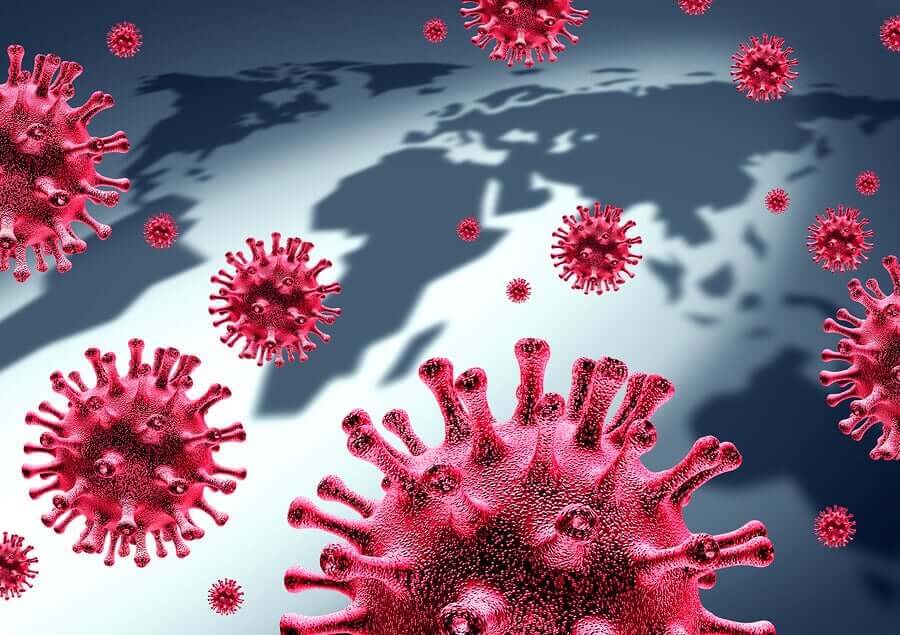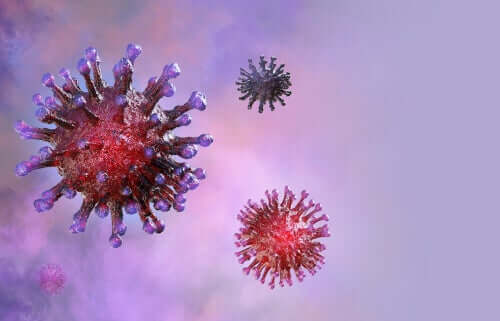Vitamins and Melatonin in the Fight Against Coronavirus


Written and verified by the nutritionist Saúl Sánchez Arias
Scientists are currently exploring different treatments for the coronavirus, and most of them are pharmacological. The main focus is the improvement of bilateral pneumonia, which is responsible for many deaths. However, experts are beginning to investigate other ways to manage the disease. Many of them are based on the administration of micronutrients in high doses. These include vitamins and melatonin, particularly vitamins C and vitamin D.
Vitamins and melatonin in the treatment of coronavirus
In China, experts have initiated a treatment protocol for this disease. This consists of the administration of intravenous vitamin C together with other antiviral drugs. They’ve set up a clinical trial with 140 participants to evaluate the results of this therapy.
They’ve initiated this study based on a systematic review published in the Journal of Medical Virology. It shows the potential of certain vitamins for the treatment of several types of coronavirus. For this reason, scientists have postulated that the administration of vitamin C and zinc could be beneficial to combat this type of virus.
On the other hand, there are scientific articles that link vitamin C deficiency with immune system malfunctioning. Normal doses of this substance can stimulate our bodies’ defenses. Also, high doses of vitamin C are able to reduce the incidence and duration of viral diseases.
Furthermore, the available scientific literature states that the intake of vitamin C causes an activation of the lymphocytes and is safe at high doses. Other systematic reviews indicate that the use of hydrocortisone, thiamine and ascorbic acid (vitamin C) is effective in the treatment of sepsis. Research has shown that sepsis and multiorgan failure are two of the leading causes of death from coronavirus infection. Another function of this drug combination is the repair of endothelial barrier dysfunction in the lungs, according to a study published in the journal Chest.

Read also: Coronavirus and Cancer: What You Need to Know
Vitamin D and the Immune System
A recent article published in the journal Medicine & Pharmacology suggests that maintaining a blood vitamin D concentration above 50 ng/ml reduces the likelihood of infection with an influenza-like virus by 27%.
Moreover, vitamin D intake deactivates the production of renin, an enzyme necessary for the production of angiotensin II. The latter has a vasoconstrictive effect that causes inflammation and increased blood pressure. Coronavirus infection has close links to the increased production of this enzyme.
Also, scientific articles are recommending the use of high doses of vitamin D for the treatment of pneumonia, along with the relevant pharmacological guidelines. High values of this micronutrient have also been associated with a lower likelihood of respiratory infections., according to the journal BMC Infectious Diseases.
Finally, the intake of high values of vitamin D seems safe according to experts. However, more trials are needed to assess the risk of kidney stones if this nutrient is given with calcium supplements.
Melatonin and coronavirus
In the prevention section, it’s necessary to highlight the possible role of this hormone that regulates our sleep-wake cycles. Experts have investigated the role of this substance in the prevention of influenza, with positive results. According to scientific research, melatonin produces a decrease in the production of cytokines. These are proteins that can produce inflammatory processes in the human body.
However, the tests carried out in this respect have been performed on mice, and so experts cannot fully extrapolate the results to humans. However, some authors defend the use of this substance when treating or preventing viral pneumonia. Science has widely documented the antioxidant and anti-inflammatory effects of melatonin.

Find out: The Mutation of Coronavirus Explained
Nutrients and coronaviruses: the research continues
Due to the lack of knowledge in the scientific community about the new coronavirus, many new therapies are being tested to try to reduce mortality. Apart from the available pharmacological treatment, scientists are researching the inclusion of micronutrients in high doses to alleviate the effects of pneumonia and sepsis.
Many clinical trials have been started in recent months. However, the results haven’t allowed experts to draw any firm conclusions based on the evidence collected. Nevertheless, a great deal of research does suggest that the use of certain vitamins and melatonin may be useful in both prevention and treatment of the disease, provided they are associated with other antiviral compounds.
All cited sources were thoroughly reviewed by our team to ensure their quality, reliability, currency, and validity. The bibliography of this article was considered reliable and of academic or scientific accuracy.
- ZhiYong P., Vitamin C infusion for the treatment of severe 2019 nCoV infected pneumonia. 2020.
- Lei Z., Yunhui L., Potential interventions for novel coronavirus in China: a systematic review. Journal of Medical Virology, 2020.
- Anitra C., Silvia M., Vitamin C and immune function. Nutrients, 2017. 9 (11): 1211.
- Bos MJ., Influence of vitamin C on lymphocytes: an overview. Antioxidants, 2018. 7 (3): 41.
- Christopher MS., Rober DL., Christopher GL., Phase I clinical trial to evaluate the safety, tolerability and pharmacokinectics of high-dose intravenous ascorbic acid in patients with advancer cancer. Cancer Chemotherapy and Pharmacology, 2013. 72 (1): 139-146.
- Paul EM., Hydrocortisone, ascorbic acid and thiamine (HAT Therapy) for the treatment of sepsis. Focus on ascorbic acid. Nutrients, 2018.
- Nektarios B., Vikramjit K., John D., Hydrocortisone and ascorbic acid synergistically prevent and repair lipopolysaccharide-induced pulmonary endothelial barrier dysfunction. Chest, 2017. 152 (5): 954-962.
- William BG., Henry L., Sharon L., Carole A., et al., Vitamin D supplementation could prevent and treat influenza, coronavirus and pneumonia infections. Medicine & Pharmacology, 2020.
- Das RR., Singh M., Naik SS., Vitamin D as an adjunct to antibiotics for the treatment of acute childhood pneumonia. Cochrane Database Syst Rev, 2018.
- Esposito S., Lelii M., Vitamin D and respiratory tract infections in childhood. BMC Infect Dis, 2015.
- Aloia JF., Katumuluwa S., Stolberg A., Usera G., et al., Safety of calcium and vitamin D supplements, a randomized controlled trial. Clin Endocrinol (Oxf), 2018. 89 (6): 742-749.
- Shing Hwa H., Ching Len L., Shyi Jou C., Li Ge S., et al., Melatonin possesses an anti influenza potential through its immune modulatory effect. Journal of Functional Foods, 2019. 58: 189-198.
- Reiter RJ., Tan DX., Terron MP., Flores LJ., Czarnocki Z., Melatonin and its metabolites: new findings regarding their production and their radical scavenging actions. Acta Biochimica Polonica, 2007. 54 (1): 1-9.
This text is provided for informational purposes only and does not replace consultation with a professional. If in doubt, consult your specialist.








